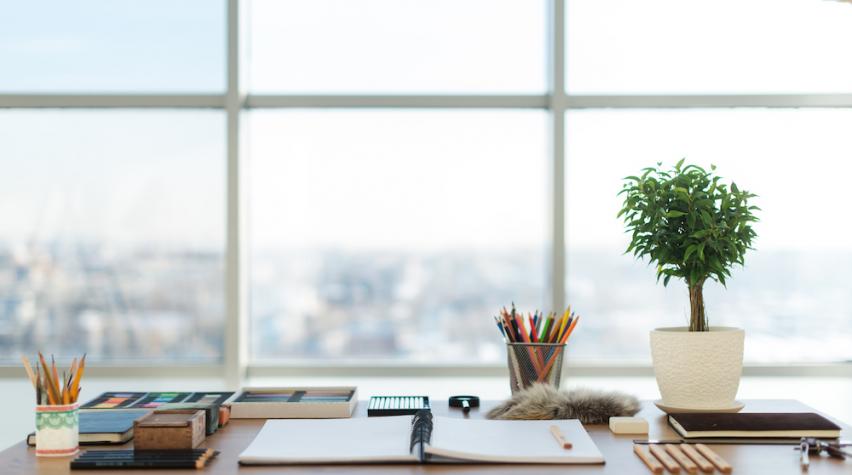
Albert Einstein said, “If a cluttered desk is a sign of a cluttered mind, of what, then, is an empty desk a sign?” If you are inclined to agree with Einstein, you may think that a messy work area or home is indicative of creativity or the ability to think big. For many of us, however, disorder is only a big distraction and adds to our daily stress.
If your desk does look like Einstein’s, consider its impact on those around you. “Clutter can create negative moods and annoy others. It’s also important for organizations to promote order and cleanliness as part of a good safety culture,” points out Luis Alosilla Lazo, safety risk coordinator, REPSOL. Andrea Walker, a certified professional organizer and owner of Smartly Organized LLC, explains her perspective: “It’s harder to relax and be creative among clutter. It’s overstimulating when your space is full of too much stuff.”
Walker equates clutter with delayed decisions that continue to collect. “At a fundamental level, you have not decided what to do with all those items strewn about your space. For instance, the mail piles up on the counter because you don’t have a process for dealing with it. Then, it becomes a huge chore you put off each day.”
Decluttering and organizing can help you clear your brain and focus on the tasks you want to accomplish. It is also a way to control your surroundings. “So much of what is happening in the world right now is out of our control. When you can take a positive action like organizing your desk or a shelf, you feel more in charge,” says Walker. You will also save time, and often money, because you can find things more easily.
For many of us, getting started can be the hardest part of getting organized. “Take one small thing at a time. Set a time aside each day, or once a week, and do whatever you can,” advises Elizabeth Sendich, lead industry economist for the U.S. Energy Information Administration. “Remember that progress, even if small, is still progress.”

You are more likely to make progress if you start with an area such as a bookshelf or a junk drawer that is not an emotional hot spot for you. Move everything out of this space to a neutral spot. Assess each item by asking yourself: When was the last time I used this item? Do I need it? If I let it go, can I replace it easily? Add back only those items you need and use. Plan to donate, recycle, or discard the rest.
Try the following techniques to help you to organize your home and workspace and reduce stress.
Declutter your mind
Make meditation and yoga a daily habit to help you clear your mind of negative thoughts and stressors. In addition, “doing yoga every day for 10 to 15 minutes helps tremendously in focusing and accomplishing tasks,” says Sudhir Brahmbhatt, president of Technology Services, Inc.
Develop a personal system
Create a daily routine to process mail, paperwork, and action items. For example, Ben Freireich, technical director at Particulate Solid Research, Inc., uses productivity consultant David Allen’s five-step methodology to maintain his personal productivity and reduce clutter (https://gettingthingsdone.com). Brahmbhatt organizes his life using a calendar-planner to schedule activities and a filing system to maintain order.
Rely on storage solutions
The key to staying organized is having a home for the items you decide to keep. Organize paperwork in labeled folders and use attractive containers and shelving units to create a filing and storage system you will enjoy using.
Get rid of digital clutter
Invest a few minutes each day to clean up your email inbox and empty your trash folder. Turn off instant messaging or email notifications so you can focus on the task at hand.
Reset your space
When you leave a room, “Pack it out, like the Boy Scouts do. Create the habit of leaving a room in better shape than you found it. Empty the trash and clear stray items off your desk or countertop,” says Walker.
Practice being smart lazy
It is smarter and easier in the long run to put something away, rather than letting things pile up. For instance, says Walker, “You may think it’s a hassle to hang up your coat when you come home, but it takes two seconds. Then, you don’t have to sort through a pile of the family’s coats to find yours when you’re leaving the next morning.”
Enlist the help of an expert
If organizing does not come naturally, consider working with a professional who can help you order your space and teach you organizing skills. The National Association of Productivity and Organizing Professionals can help you find a professional organizer in your area.
This article originally appeared in the Career Connections column of the August 2020 issue of CEP. Members have access online to complete issues, including a vast, searchable archive of back-issues found at aiche.org/cep.


